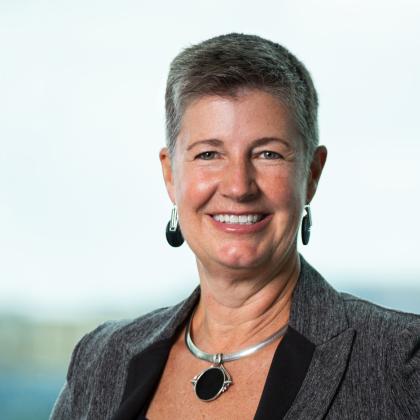MITRE’s ranks include female cyber experts who’ve been leaders in the field for decades. Many helped create early cyber doctrines, processes, and breakthroughs that the cyber community still uses today. Retired Air Force Col. Cynthia Wright found her “second act” promoting cybersecurity to the rest of the world.

Cybersecurity Expert Breaks Trail for Tomorrow's Cyber Workforce

Cynthia Wright attended the U.S. Air Force Academy with the intention of becoming an astronaut. At the time, she was unaware of a significant barrier to entry—the high-flying career path required non-mission specialist candidates to first become test pilots, a field that didn’t admit women until 1993.
Wright realized this unpleasant reality just two courses shy of completing her astronautical engineering degree. In a show of frustration, she shifted her studies to philosophy and leaned on a mentor for guidance to a Plan B. Wright toggled between pursuing studies in communications and intelligence, but ultimately decided communications would offer the most diverse experience.
Perhaps to make up for the astronaut disappointment, the universe showered Wright with a bit of luck that put her on a new career trajectory. “My first job at the Pentagon, I became chief of operations for the IT systems in the National Military Command Center. Combat communications got me deployments; deployments led me to headquarters positions shaping national cyber policy.”
“I went from wannabe astronaut to disgruntled philosopher to Air Force cyber officer,” Wright says with a laugh.
She climbed the ranks to colonel and helped create presidential directives around cyber in the early 2000s. When she joined MITRE in 2014, the company tapped her to expand that impact on an international level.
Diplomacy Makes the [Cyber] World Go Round
MITRE’s Irving Lachow, Ph.D. initially reached out to Wright for assistance with national cyber strategy development for the Department of Defense. The work eventually broadened to the State Department’s International Cyber Capacity Building (ICCB) program. It helps under-resourced countries recover from devastating cyberattacks and build strategy and preparedness plans for the next one. Strong cyber capacity in partner nations is essential for U.S. national and domestic security.
Now, close to a decade later, Wright is one of only two remaining members of the original ICCB team. Since its inception, the program has assisted nearly 100 countries and continues to grow in geography and scope.
Spending years in senior military positions gives you great insight into the big picture.
Her 25 years of active duty service focusing on cyber strategy readied Wright for the ICCB’s mission. As a colonel, Wright oversaw 700 people across three organizations, giving her experience “breaking ginormous problems concerning national interests into something you can tackle,” she says. “Spending years in senior military positions gives you great insight into the big picture.”
A 360-Degree View of National Threats
In 2016, Wright produced thought papers on hypothetical cyber threats for the Department of Homeland Security office that eventually became the Cyber Security and Infrastructure Agency. The papers identified gray zone operations—attacks from a nation state designed to fall just short of war—as some of the biggest threats to our national security.
Today, such operations are common, as seen in Russian activities across Europe and incursions into critical infrastructure by malicious actors around the world.
Wright is also a member of the MITRE team working with the Joint Cyber Defense Collaborative to build a government-private-sector relationship for national cyber resiliency on an organizational level—an effort especially vital since our critical infrastructure is run by private companies.
Evangelizing for the Cyber Workforce
Wright’s personal experience as a woman advancing in the cyber field has informed her views on needs of the current global workforce. One of her ICCB workshops specifically addresses the labor gap, which increased by more than 25% globally this year. The exercise requires peeling back the onion to find and address roadblocks with realistic steps forward.
For example, many countries need alternatives to university cyber programs that are shorter, more accessible, and more directly relevant to the needs of government and industry. Her contributions also helped inform the U.S. national cyber workforce development strategy.
In the United States and abroad, Wright cites a massive messaging deficit on how cyber careers are presented to young people. “Many still think of cyber as the guy on his computer drinking Monster and eating pizza in his parent’s basement.” That’s not the picture of success for job seekers wishing to make an impact on the world, she says. An important first step is introducing digital skills in middle school, encouraging children to make positive associations early with a multitude of modern career paths.
Wright’s advice to prospective cyber professionals sounds like more of a public-service announcement to young people generally. “Anything you want to do out there in the world today has a cyber aspect,” she says. “Cyber is rarely the end goal but rather the means to protect, to manufacturer, to build, to change, to communicate. There are so many strings to pull and threads to follow.”
Interested in solving problems for a safer world? Join our community of innovators, learners, knowledge-sharers, and risk takers. View our Job Openings and Student Programs. Subscribe to our MITRE 360 Newsletter.